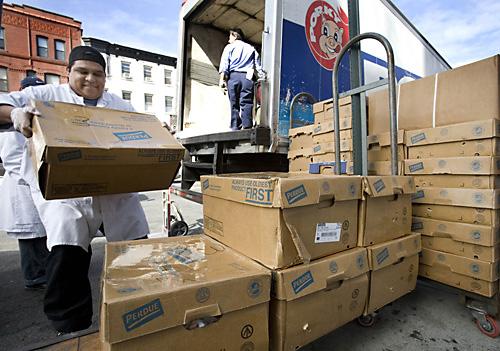Ethanol demand raises food prices

October 9, 2007
CHAMPAIGN, Ill. – The cost of food spiked right on cue last year when economists warned that the country’s thirst for ethanol would drive up the cost of the grain used to feed livestock for meat, dairy and other foods.
But economists say it isn’t all ethanol’s fault, and warn that Americans have yet to feel the full force of the corn-based fuel additive on food prices.
“We have a huge expansion under way,” Iowa State agricultural economist Robert Wisner said. “That will almost certainly tighten grain supplies.” Feed is one of the largest costs in the livestock and dairy industry, he said.
Corn prices started rising sharply in September 2006 as the ethanol industry’s demand grew, driven by high oil prices and a federal mandate for the U.S. to use 7 billion gallons of renewable fuels by 2012.
Meat and dairy prices have increased since late summer 2006 – 6.7 percent for ground beef, 6.9 percent for chicken breasts and a painful 26 percent for whole milk, according to the Labor Department.
Get The Daily Illini in your inbox!
Ethanol-driven corn demand is one reason, Wisner said, but so is international demand for American livestock and feed. Consumers in prosperous Asian economies are buying more meat than ever, and the weak dollar adds to the effect, making American food more affordable for overseas buyers.
Wisner and others say food-price increases more directly attributable to ethanol are ahead, though they aren’t sure how big they’ll be. A recent drop in the price of ethanol and fears of a glut have led to a slowdown in new plant construction.
But corn futures prices suggest traders are still bullish; prices are running between $3.75 and $3.95 a bushel for most of next year and just over $4 for all of 2009.
Companies like Arkansas-based Tyson Foods Inc., the nation’s largest meat processor, say they’ve already started passing on corn-related price increases to their customers.
Still, most food companies have absorbed far more than they’ve passed along, but won’t do so forever, said Michael Swanson, an economist with Wells Fargo & Co.
“I met with a couple of major food producers this week, and they had not been able to pass along the entire amount of the increase yet,” Swanson said by phone as he drove behind a combine in southern Minnesota corn country. “But they’re working to pass that along.”
Farmers, of course, like the high corn prices. But they’re consumers, too, and some say that the nation may have to decide in the not-too-distant future which it wants more: ethanol or low-cost steaks, chicken and milk. “If this ethanol takes off like it could, the price of corn’s going to be really good for a few years,” said Kyle Winkelmann, who grows soybeans and corn in Tallula, Ill., about 90 miles north of St. Louis.






